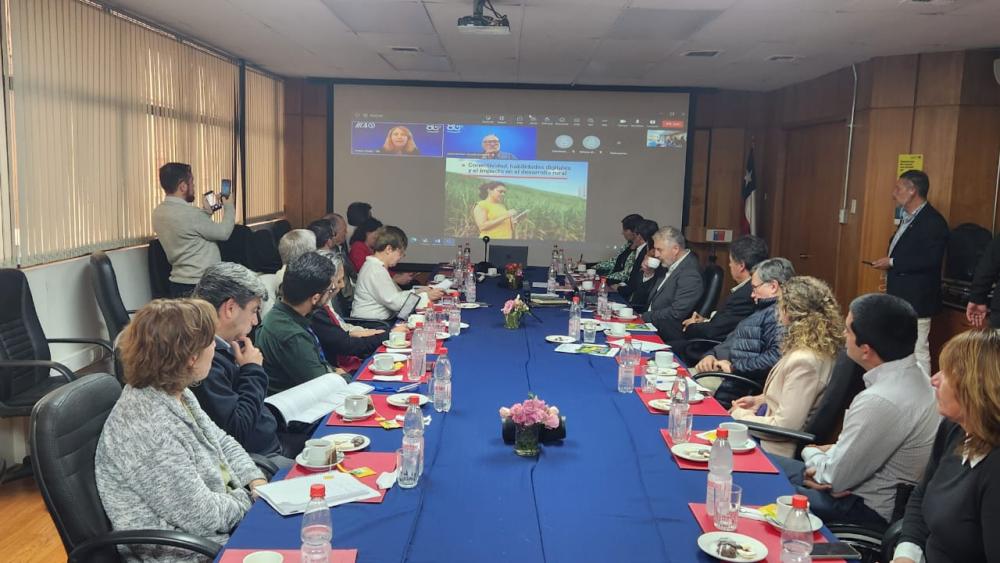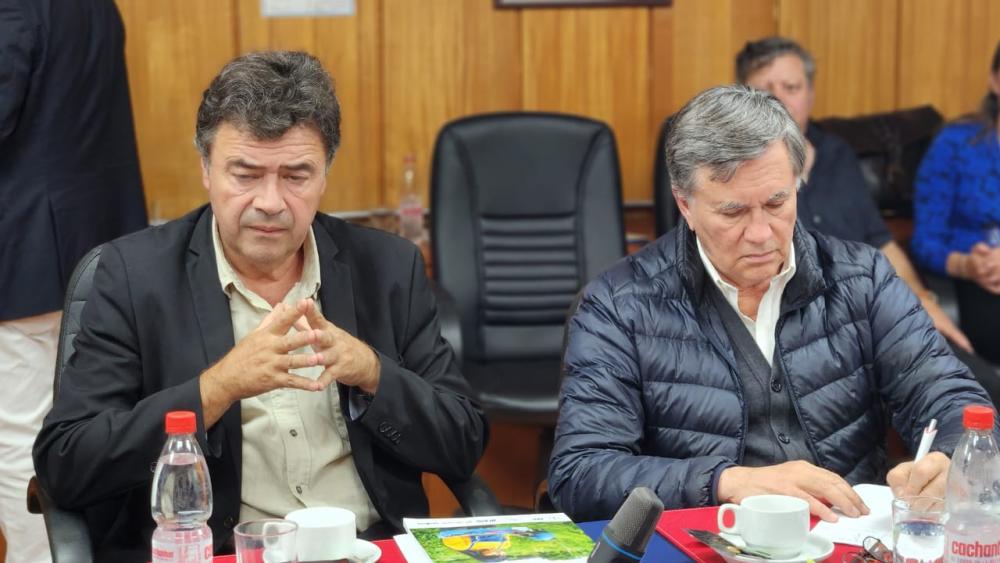Equip farmers with more digital skills to enhance technology use in food production, say experts at a presentation in Chile of a rural connectivity study for Latin America and the Caribbean

Santiago, 17 April 2023 (IICA) – High-level officials and experts at a presentation in Chile of the study “Rural Connectivity in Latin America and the Caribbean: State of Play, Challenges and Actions for Digitalization and Sustainable Development” all agreed that farmers must be equipped with digital skills in order to better harness the potential of new technologies in food production. The study was conducted by the Inter-American Institute for Cooperation on Agriculture (IICA), the World Bank, Bayer, CAF- Development Bank of Latin America, Microsoft and Syngenta.
Esteban Valenzuela, Chile’s Minister of Agriculture, was present at the meeting, which took place at the headquarters of the Ministry in Santiago. On the same occasion, Paulina Carrasco, a dairy producer from the Los Ríos region, and Bernarda Salazar, a beekeeper from Ñuble, were awarded their certificates as IICA “Leaders of Rurality”. The presentation was done by IICA Director General, Manuel Otero and Minister Valenzuela.
Leaders of Rurality is an IICA initiative that pays tribute to men and women who are working to improve the welfare of their rural communities in the Americas, which are key to food and nutrition security and the environmental sustainability of the planet.
Mild improvement in rural connectivity

The rural connectivity study is a continuation of and update to the first study on this issue, which IICA and its partners undertook in 2020. That study revealed that 77 million people had no access to quality internet services. The update indicates that there has been a 12% increase in rural connectivity in the region and Chile has moved to the top cluster, along with countries reporting the highest level of significant rural connectivity.
The new document presents updated data and illustrates the current status of rural connectivity in Latin America and the Caribbean, reconstructing the information for the 2020-2022 period. It offers an exhaustive look at gains taking place in the region over the last two years, in terms of rural connectivity and the use of digital technologies, whether as a result of public policies, public and private partnerships or international cooperation.
The report also outlines digital skills training needs for the overall adult population, and specifically for youth and women living in rural areas.
Minister Valenzuela remarked that, “This is a very powerful study, which in Chile’s case demonstrates that we are only halfway along the road, since 50% of the rural population has no access to quality internet services”.
He pointed out that, “There is a connectivity gap between the urban and rural sectors that must be bridged, and we are working towards this. Today, internet is a basic commodity and not having it puts rural people at a disadvantage in many ways, for example in terms of trade”.
“I hope that this study will be ongoing, since it offers us recommendations that we intend to follow”.
On the other hand, Manuel Otero insisted that, “Studies are valuable if they trigger change, if they build critical awareness or alert us to the need to make certain necessary changes”.
“This research study that we spearheaded four years ago reveals that some changes have occurred during the period”, he said. “However, improvements in urban connectivity have been much more rapid, thereby widening the gap between the country and the city”.
Otero also reflected on the investments that the Government of Chile had made to bring significant connectivity to rural sectors.
The IICA Director General pointed out that the COVID-19 pandemic had prompted the return of many youngsters to rural areas, thus lowering the average age of rural inhabitants in some countries in the hemisphere.
“If this is the case—he said—youngsters will now clamor for increased connectivity, which would be welcome news”.
A mobile gap
IICA specialist Sandra Ziegler, who co-authored the document with Joaquín Arias, another employee of the Institute, maintained that, “The use of new communication technologies can offer new benefits for farmers, who can use them to receive information on climate, inputs, new production techniques and even may even be able to reduce their costs. The cell phone has been linked to improved employment possibilities and greater opportunities in general for rural women”.

Ziegler said that in 2020, 63% of rural dwellers had no access to a high-quality internet connection and that, by 2022, that figure had decreased to 57%. Notwithstanding, while this is good news, she warned that the urban and rural divide continues to grow.
She explained that, “For the ten countries that had available information, there was a 36 percentage point difference between connectivity in urban areas and the countryside, as compared to the 34% gap in 2020”.
“We are looking at a divide – a mobile phone divide. We take one step forward and the bar moves, whether because of technological advances or the obsolescence of old devices”, she added.
Ziegler also mentioned the importance of acquiring digital skills, revealing that a survey in seven Latin American countries had indicated that 38% of people did not use the internet because they were not versed in its use and another 26% had no exposure to it at all.
She ended by stating that, “We have many obstacles to topple. We must train people with digital skills for this era and work on education. Children and youth in rural homes are important in driving new technology use. This document offers recommendations to spur investment and foster public-private partnerships in an area that is critical to the future of rural areas”.
More information:
Institutional Communication Division.
comunicacion.institucional@iica.int